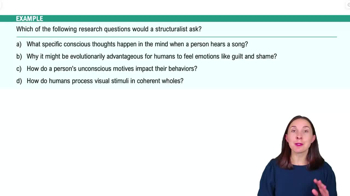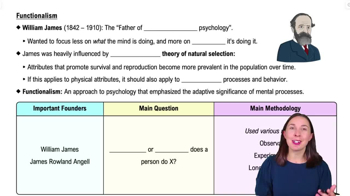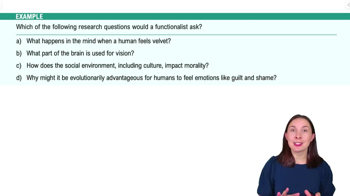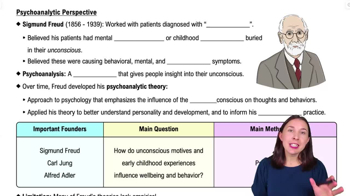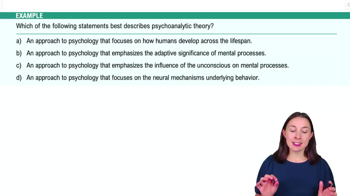Table of contents
- 1. Introduction to Psychology1h 43m
- 2. Psychology Research2h 20m
- 3. Biological Psychology2h 41m
- 4. Sensation and Perception28m
- 5. Consciousness and Sleep32m
- 6. Learning41m
- 7. Memory34m
- 8. Cognition37m
- 9. Emotion and Motivation35m
- 10. Developmental Psychology33m
- 11. Personality48m
- 12. Social Psychology41m
- 13. Stress and Health41m
- 14. Psychological Disorders44m
- 15. Treatment47m
1. Introduction to Psychology
Early Schools of Thought
Struggling with Psychology?
Join thousands of students who trust us to help them ace their exams!Watch the first videoMultiple Choice
The belief that every experience can be broken down into its individual emotions and sensations is known as
A
structuralism.
B
objectivity.
C
sensationalism.
D
functionalism.
 Verified step by step guidance
Verified step by step guidance1
Understand the key concept: The problem is asking about a belief in psychology that focuses on breaking down experiences into individual components.
Identify the term that matches this belief: Structuralism is a school of thought in psychology that aims to analyze the structure of the mind by breaking down mental processes into their most basic components.
Differentiate between the options: Objectivity refers to the practice of being unbiased and impartial, sensationalism is not a recognized psychological theory, and functionalism focuses on the purpose of consciousness and behavior rather than breaking them down.
Relate the concept to historical context: Structuralism was developed by Wilhelm Wundt and furthered by his student Edward Titchener, emphasizing the analysis of the mind's structure.
Conclude by matching the definition: The belief that every experience can be broken down into its individual emotions and sensations aligns with the principles of structuralism.

 5:44m
5:44mWatch next
Master Structuralism with a bite sized video explanation from Hannah Gordils
Start learningRelated Videos
Related Practice



